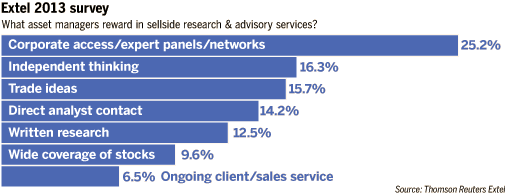The 2013 Thomson Reuters Extel survey shows that 25% of client commissions were used to reward brokers for corporate access, down from 27% in 2012. Among UK-based managers, the fall has been slightly larger, from 27% to 21% as a result of the FSA’s clampdown.
With an overall commission pot of $5 billion this suggests that $1.25 billion is being paid for Corporate Access. The FT notes that some hedge funds are paying brokers $20,000 an hour to meet CEOs.
Steve Kelly, MD of Thomson Reuters Extel, was quoted in the FT on June 9, saying the figures exposed a “’fundamental contradiction’, in that use of client commissions to pay for corporate access was now outlawed, but it remained a service many asset managers valued highly.”
The FT reported that “Mr. Kelly was adamant that asset managers were not simply flouting the edicts of the FSA and the Financial Conduct Authority, its successor body. It has been visibly clear to me that the buy-side has been reacting to what the FCA has said. They are definitely not ignoring it.”
Daniel Godfrey, chief executive of the UK Investment Management Association was quoted in the same article saying that the industry had reacted “very strongly” to the regulatory clampdown and that asset managers were not breaking the rules. “My bet is that client money is not being used to pay for corporate access in ways that are outside the definition of research. If it is straight corporate access, firms are paying for it out of their own pockets,” he said, a practice that is allowed.
Asset managers are able to use investors’ money to pay sell-side brokers for research, and Mr. Godfrey argued payments for corporate access were still permissible if they were “part of a process or part of a product that can clearly be defined as research”. Mr. Godfrey said the IMA had set up a working party to examine how research should be paid for.
However, Alan Miller, chief investment officer of SCM Private, the London-based investment manager, and a campaigner for more transparent fees is quoted as saying: “There is evidence that, following the FCA review, some companies have simply relabelled these payments as research to get around the rules.”

